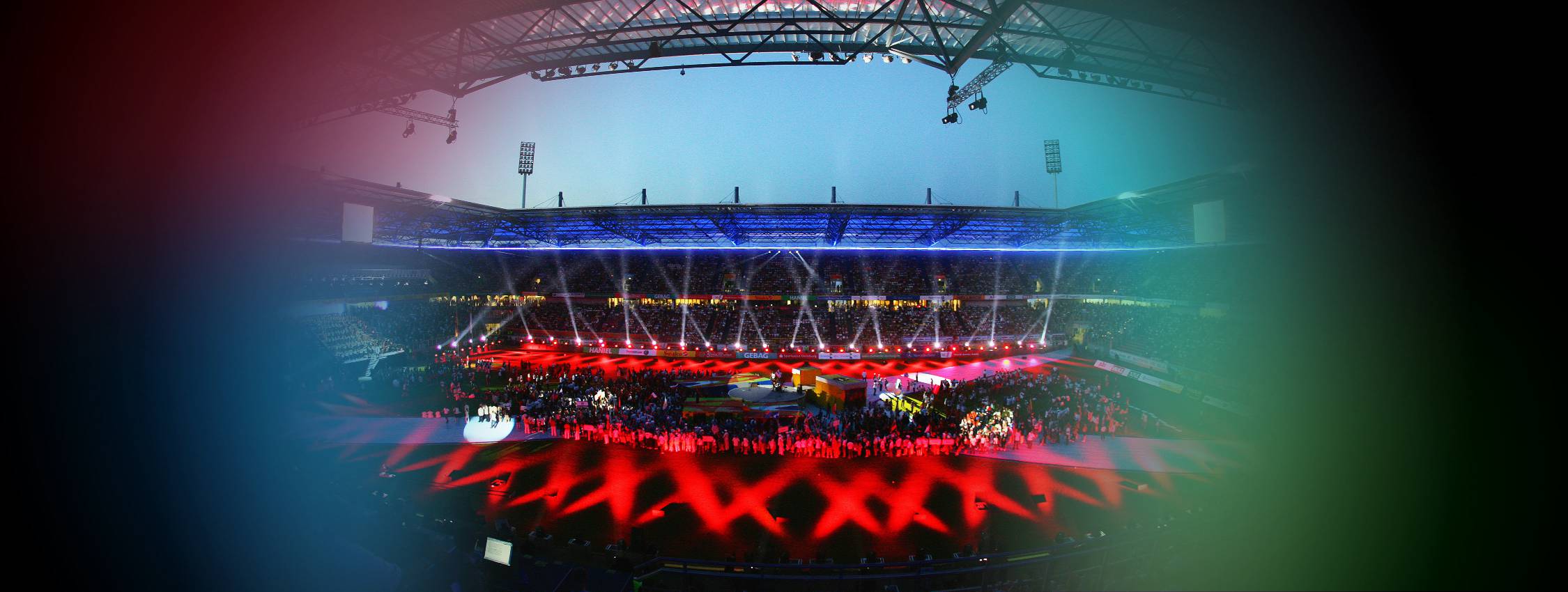The Games Changer
The 7th edition of The World Games took place from 14 to 24 July 2005 in Duisburg, Germany. This industrial city in the west of Germany with 500,000 inhabitants organised the Games together with its partner cities Bottrop, Mülheim an der Ruhr and Oberhausen.
The World Games 2005 set new standards in many aspects. These standards are still benchmarks and signposts for the Host Cities of TWG today. A total of 26 sports were part of the official programme, and in addition there were five invitational sports or disciplines. For the first time more than 3,000 athletes participated in The World Games. In total there were 3,149 (2,456 in the official programme plus 693 in the invitational sports). There was also a record number of participating nations. Within the 178 medal events (169 official programme + 9 invitational sports), athletes from 93 nations strived for Gold at TWG.
As in Akita in 2001, Russia took first place in the medals table. In Duisburg the top-ranked team collected 27 gold medals, 19 silver medals and eleven bronze medals. In second place was the host nation Germany (19/18/20) ahead of Italy (13/9/13). Once again the assumed home advantage was confirmed.
The German team had achieved a better result only at the Games in Karlsruhe in 1989 (also a German city). The most successful athletes were Olga Krapanova (Russia, Acrobatic Gymnastics) and Jana Maisel (Germany, Casting). With a total of 76 World Champion titles, Jana Maisel has achieved an entry in the Guinness Book of Records.
Debuts and Farewells
Canoe Polo made its debut at The World Games. Inline Hockey replaced Roller Hockey. Sumo, in Akita, Japan in 2001 as an invitational sport for the first time, premièred in the official programme. Casting, on the other hand, was (up to now) on the programme for the final time. Beach Handball was again represented in the invitational sports. Since 2013 (Cali, Colombia) Beach Handball has been in the official programme. In 2005 Indoor Hockey was represented for the first and so far only time as an invitational sport, as well as Indoor Trial, a motor sport, and Nine Pin Bowling, a very popular sport especially in Germany.
The opening and closing ceremonies along with the ten days of competition were attended by a total of 205,000 spectators. A total of 500,000 visitors came to the Plaza, the cultural festival accompanying The World Games. The Opening Ceremony took place on 14 July in the sold-out MSV Arena. For the first time, the athletes entered the arena grouped by nation; previously the march-in was grouped by sport. The Opening was performed by Federal Interior Minister Otto Schily (SPD).
A total of 23 competition venues were used. These included the facilities of a former iron foundry and a music theatre. Another special feature was that Duisburg was able to use its Sportpark as a central event location. Nine competition venues were thus located within a radius of one kilometre. The Plaza and the stadium with the opening and closing ceremonies were also located here. Another central event location was the Landschaftspark Nord, the former iron foundry, used as the venue for a total of four sports.
Setting New Benchmarks
Duisburg set new standards: first, the complete results service and accreditation were managed by Wige Data, later merged with Swiss Timing. As host broadcaster, Wige TV produced all sports from the semi-finals onwards. Wige TV also took over the marketing of the TV rights, with live broadcasts in Russia and China and a daily highlights show covering the competitions every day. The regional television station WDR broadcast the Opening Ceremony live. Almost 1,000 media representatives were accredited for the competitions.
The World Games 2005 set further standards in terms of the preparation and the branding of the venues. The agency Von Mannstein had created a holistic design and CI concept that was used uniformly at all competition venues. The subsequent organiser Kaohsiung (Chinese Taipei) used a variation of this design for its Games. For the first time the International Federation of Sports Chiropractic (FICS) provided care off the field. They prepared athletes to enable them to perform at their best. Since 2005 FICS has been a partner of the IWGA at each event.
As a mascot, the organisers presented a fantasy figure in the design of the 2005 Games. The name Allwin was a play on words with reference to the German first name Alwin and the English phrase "All win".
Legacy of the event
Regarding the legacy of the Games: The final agreement to build a new stadium in Duisburg was made possible by The World Games. The specially-built skating rink is still open to the public. The German Olympic Sports Confederation subsequently decided to make the promotion of non-Olympic sports dependent on results at The World Games.

